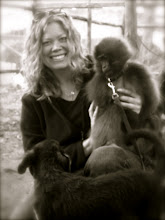Each of the schools has had varying levels of success. Some have had great ideas, but have had to deal with unforeseen setbacks. This is the case of the school that decided to use the money to purchase a dairy cow (i.e. to sell the milk), but then had to put the cow down when it developed an incurable sickness. Another school decided to build a shower house (truly a much needed service), but due to power and water shortages has yet to open its doors to clients. One school we visited had started a teahouse and a small shop within the school compound that was experiencing a moderate level of success. What was neat to see is that the students were so excited about their project that they (along with a very supportive teacher) also planted a garden of garlic, which when ready will be sold at the market. It was exciting to see them excited about finding ways to support themselves.
The other purpose of our road trip was to share that the CASCAID program would likely be coming to a close. World Learning, like all other NGOs, is dependent upon grants for its funding. Grants are tied into project proposals that have a beginning and an end date. Sometimes projects are extended and sometimes they are not. It is understandable that funding cannot continue forever, but try to explain that to a child who may not be able to attend school if he can’t find money to purchase a pen. I think this is my least favorite aspect of being a PCV. When students, teachers, and administrators meet me, they see me as the one who controls the purse strings. I find it truly impossible to explain how or why these decisions are made in a manner that is even remotely understandable to a child whose life is filled with so much uncertaintly and hardship. And this is exactly what I told Yidelu when he said, “…but what will I do without World Learning?” Yidelu (age 15) is one of the “fortunate” dual-orphaned kids who currently receives some assistance through World Learning. He is bright (one of the top students in the 8th grade) and resourceful (he helps to support himself by selling the eggs from the 3 hens that he owns), but is hanging on by a thread. He has dreams and aspirations and knows that education is the key to changing his life, but will he be able to afford schools supplies and a school uniform next year without World Learning?
I leave these encounters drained. I also leave these visits with more questions than answers. Will Yidelu continue to find a way to finish his education? What about the thousands of other “yidelus” all over Ethiopia who depend upon projects such as CASCAID? Will Ethiopia ever find a way to bring its people out of the clutches of poverty?

Me and Yidelu

Emanuel School OVCs and their garlic garden

My colleagues Muluken and Animo checking out the “shower house”

A shop that was donated and will eventually be rented to generate income for OVC in Dembecha

I had the opportunity to meet Muluken’s parents and little sister during the course of our road trip.

Me with Muluken’s family.

